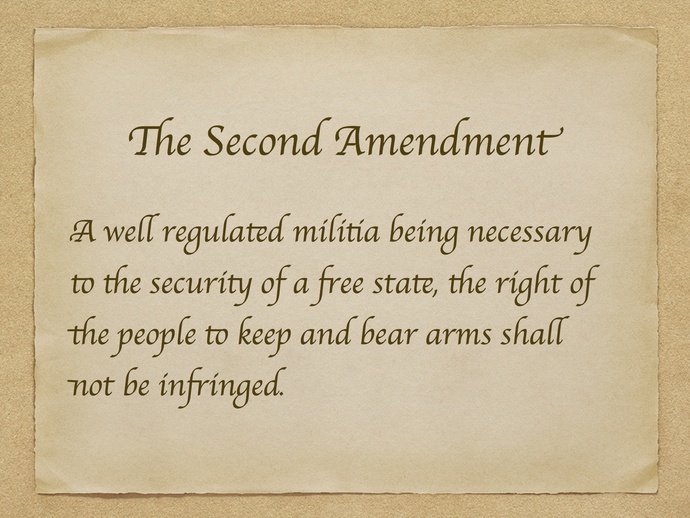
The language that was used to frame it is rather imprecise, which is unfortunate, because it has caused a great deal of confusion over the years, for that very reason. It's been said there is more than one way to interpret it, but if every word is interpreted literally and one doesn't make the mistake of trying to "read between the lines", it becomes less of a problem (although it still is extremely problematic nonetheless).
"A well regulated militia". Roughly the equivalent to a national guard (or reserve force), militias were necessary at the time the amendment was introduced (1791), simply because at that time the United States had a tiny regular army, and virtually no navy. There was the very real possibility that much stronger European powers, primarily Britain, France and Spain, would attempt to snuff out the newly formed republic, and therefore it had to be a "well regulated" force, and not just some undisciplined rabble.
"...being necessary to the security..." This naturally follows on from what goes before, the most important consideration at the time being the very survival of the new nation.
"...of a free state,..." That is, an independent state, one that didn't want to find itself once again a colony of Great Britain (whom they'd just won a war against, with a lot of help from the French).
"...the right of the people to keep and bear arms..."
This is where it gets a little complicated. That term: "arms". We would naturally enough believe it to be synonymous with the term 'weaponry', and that's how I and many others see this, but this in turn creates other, more obvious, problems. Back in 1791, the deadliest 'arms' that people had were relatively primitive, one-shot muskets that took ages to load, and of course cannons, which were just as ineffective and inaccurate. Now, however, we've developed techniques to kill each other off that would have simply amazed (and I can imagine, horrified) the people of the late 18th century. Chemical weaponry, tanks, missiles, drones, and bombers are just a few, and I can't imagine anyone in their right mind seriously suggesting that the private citizenry be allowed access to such equipment. It could be argued, however, that someone could make the case, based upon their own interpretation of the Second Amendment, that they should be allowed to have their very own nuclear stockpile. I mean, it would be well within his "rights" to do so, wouldn't it?
What is interesting about this amendment is what one does not find within it. Terms like "tyranny", "government" and "overthrow". So many times I've heard it said, by those who claim to venerate this amendment, that it's purpose was to ensure "freedom from tyranny", or the imposition of a tyrannical regime. That is obviously not it's purpose though, and that much can be discerned simply by reading it; the purpose of its inclusion was to allow the nation to prepare for a very real possibility, the possibility of being reabsorbed into the British, or some other, empire. In any case, if that is what many here believe it to be all about, then I have to wonder what their exact plan of action would be. How would some kind of 'citizen's army' go about taking on a U.S. government that it believes to be "tyrannical", when all they'd have would be light infantry weapons (ex. AK-47's, AR-15's) as opposed to B-2 stealth bombers, tanks, aircraft, drones, satellites and the resources of the F.B.I., N.S.A. and other government agencies and departments? Something tells me they wouldn't last five minutes.
No, it's clear to me that the Second Amendment's time expired a long time ago. It's redundant, it's an anachronism from a time when the United States didn't have the armed forces that it has today: the army, marines, air force, navy, and the second-largest nuclear stockpile in the world. Which country is actually going to invade the United States? Canada? North Korea? Russia?
 Holidays
Holidays  Girl's Behavior
Girl's Behavior  Guy's Behavior
Guy's Behavior  Flirting
Flirting  Dating
Dating  Relationships
Relationships  Fashion & Beauty
Fashion & Beauty  Health & Fitness
Health & Fitness  Marriage & Weddings
Marriage & Weddings  Shopping & Gifts
Shopping & Gifts  Technology & Internet
Technology & Internet  Break Up & Divorce
Break Up & Divorce  Education & Career
Education & Career  Entertainment & Arts
Entertainment & Arts  Family & Friends
Family & Friends  Food & Beverage
Food & Beverage  Hobbies & Leisure
Hobbies & Leisure  Other
Other  Religion & Spirituality
Religion & Spirituality  Society & Politics
Society & Politics  Sports
Sports  Travel
Travel  Trending & News
Trending & News
Most Helpful Opinions